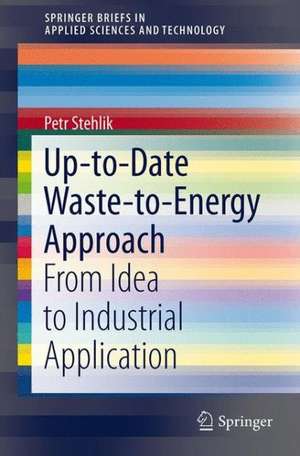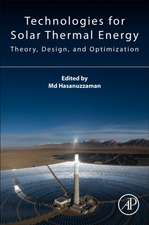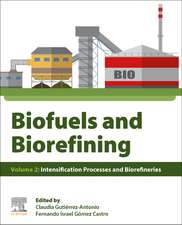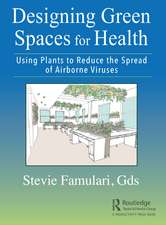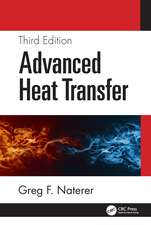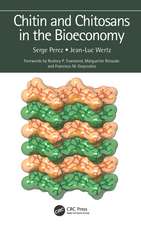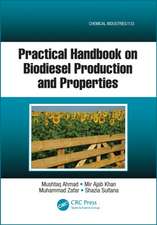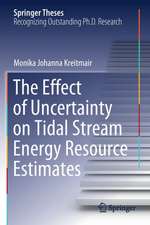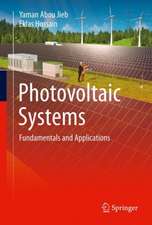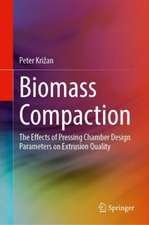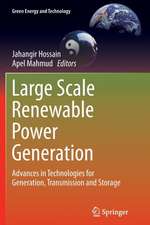Up-to-Date Waste-to-Energy Approach: From Idea to Industrial Application: SpringerBriefs in Applied Sciences and Technology
Autor Petr Stehliken Limba Engleză Paperback – 16 feb 2016
Din seria SpringerBriefs in Applied Sciences and Technology
-
 Preț: 380.29 lei
Preț: 380.29 lei - 17%
 Preț: 360.34 lei
Preț: 360.34 lei - 20%
 Preț: 386.12 lei
Preț: 386.12 lei -
 Preț: 380.07 lei
Preț: 380.07 lei -
 Preț: 377.95 lei
Preț: 377.95 lei -
 Preț: 382.32 lei
Preț: 382.32 lei -
 Preț: 376.59 lei
Preț: 376.59 lei -
 Preț: 379.09 lei
Preț: 379.09 lei -
 Preț: 378.12 lei
Preț: 378.12 lei - 20%
 Preț: 293.83 lei
Preț: 293.83 lei -
 Preț: 344.90 lei
Preț: 344.90 lei -
 Preț: 321.36 lei
Preț: 321.36 lei -
 Preț: 264.79 lei
Preț: 264.79 lei -
 Preț: 344.90 lei
Preț: 344.90 lei -
 Preț: 356.46 lei
Preț: 356.46 lei -
 Preț: 382.95 lei
Preț: 382.95 lei -
 Preț: 355.66 lei
Preț: 355.66 lei -
 Preț: 479.67 lei
Preț: 479.67 lei -
 Preț: 415.18 lei
Preț: 415.18 lei -
 Preț: 444.52 lei
Preț: 444.52 lei - 20%
 Preț: 301.86 lei
Preț: 301.86 lei -
 Preț: 409.43 lei
Preț: 409.43 lei - 20%
 Preț: 322.17 lei
Preț: 322.17 lei -
 Preț: 355.49 lei
Preț: 355.49 lei - 15%
 Preț: 462.51 lei
Preț: 462.51 lei -
 Preț: 377.18 lei
Preț: 377.18 lei -
 Preț: 355.93 lei
Preț: 355.93 lei -
 Preț: 382.95 lei
Preț: 382.95 lei -
 Preț: 378.12 lei
Preț: 378.12 lei -
 Preț: 378.12 lei
Preț: 378.12 lei -
 Preț: 380.07 lei
Preț: 380.07 lei -
 Preț: 380.07 lei
Preț: 380.07 lei - 20%
 Preț: 326.28 lei
Preț: 326.28 lei -
 Preț: 312.68 lei
Preț: 312.68 lei -
 Preț: 356.43 lei
Preț: 356.43 lei -
 Preț: 412.30 lei
Preț: 412.30 lei - 20%
 Preț: 225.31 lei
Preț: 225.31 lei -
 Preț: 378.12 lei
Preț: 378.12 lei -
 Preț: 376.59 lei
Preț: 376.59 lei -
 Preț: 195.87 lei
Preț: 195.87 lei -
 Preț: 376.22 lei
Preț: 376.22 lei - 20%
 Preț: 324.64 lei
Preț: 324.64 lei - 20%
 Preț: 288.73 lei
Preț: 288.73 lei -
 Preț: 377.57 lei
Preț: 377.57 lei -
 Preț: 261.91 lei
Preț: 261.91 lei -
 Preț: 381.98 lei
Preț: 381.98 lei -
 Preț: 273.64 lei
Preț: 273.64 lei -
 Preț: 410.87 lei
Preț: 410.87 lei -
 Preț: 379.68 lei
Preț: 379.68 lei -
 Preț: 374.30 lei
Preț: 374.30 lei
Preț: 377.73 lei
Nou
Puncte Express: 567
Preț estimativ în valută:
72.28€ • 75.47$ • 59.68£
72.28€ • 75.47$ • 59.68£
Carte tipărită la comandă
Livrare economică 15-29 aprilie
Preluare comenzi: 021 569.72.76
Specificații
ISBN-13: 9783319154664
ISBN-10: 3319154664
Pagini: 80
Ilustrații: XIV, 101 p. 64 illus., 4 illus. in color.
Dimensiuni: 155 x 235 x 8 mm
Greutate: 0.17 kg
Ediția:1st ed. 2016
Editura: Springer International Publishing
Colecția Springer
Seria SpringerBriefs in Applied Sciences and Technology
Locul publicării:Cham, Switzerland
ISBN-10: 3319154664
Pagini: 80
Ilustrații: XIV, 101 p. 64 illus., 4 illus. in color.
Dimensiuni: 155 x 235 x 8 mm
Greutate: 0.17 kg
Ediția:1st ed. 2016
Editura: Springer International Publishing
Colecția Springer
Seria SpringerBriefs in Applied Sciences and Technology
Locul publicării:Cham, Switzerland
Public țintă
Professional/practitionerCuprins
Introduction.- Conceptual Approach.- Investment Planningbased on NERUDA System.- WtE as Integrated Items - - REGION and EVELINE systems.- Selection ofConvenient Technology.- Subsystems, Equipment and Other Aspects.- ComputationalSupport.- Conclusions.
Notă biografică
Professor Petr Stehlik, is director of the Institute of Process and Environmental Engineering at Brno University of Technology in the Czech Republic. He also currently holds the position of Vice President of the Czech Society of Chemical Engineers and gained many years of experience in engineering practice prior to joining the university. At present he is also a director of research and development of a certified engineering and contracting company with activities involving waste to energy technologies.
Some of Professor Stehlik’s current responsibilities include: Executive Editor of Heat Transfer Engineering and Guest Editor of other international journals, Coordinator/Contractor of national and international research projects, Author/Co-author of numerous papers, and plenary/keynote speaker at various international conferences. He is a co-founder and President/Vice-President of PRES conference – Process Integration, Modelling and Optimisation for Energy Saving and Pollution Reduction. His research and development activities are aimed specifically at waste to energy systems, applied heat transfer, process integration in special cases, energy saving and environmental protection. He has also founded a research and development NETME Centre (New Technologies for Mechanical Engineering) and Waste-to-Energy Competence Centre. Owing to his achievements he has been awarded an Honorary Doctorate.
Some of Professor Stehlik’s current responsibilities include: Executive Editor of Heat Transfer Engineering and Guest Editor of other international journals, Coordinator/Contractor of national and international research projects, Author/Co-author of numerous papers, and plenary/keynote speaker at various international conferences. He is a co-founder and President/Vice-President of PRES conference – Process Integration, Modelling and Optimisation for Energy Saving and Pollution Reduction. His research and development activities are aimed specifically at waste to energy systems, applied heat transfer, process integration in special cases, energy saving and environmental protection. He has also founded a research and development NETME Centre (New Technologies for Mechanical Engineering) and Waste-to-Energy Competence Centre. Owing to his achievements he has been awarded an Honorary Doctorate.
Textul de pe ultima copertă
Putting forward an up-to-date Waste-to-Energy approach which combines experience, sophisticated modelling and technical-economic analysis, this book examines the current need for the maximum utilization of energy from wastes and the associated environmental impacts. With waste incinerators and industrial plants producing large amounts of pollutants, municipalities and also smaller decentralized operations are beginning to focus on waste research. The principal advantage of utilizing research results is the ability to apply a complex approach “from idea to industrial implementation” with respect to the needs of the market established via thorough market analysis. This book builds upon this locus with an original approach based on considering geographical aspects, the specifics of regions/micro-regions, and technological units and/or equipment. Key areas discussed and analyzed areas within the text include: strategic planning of locations of energy sources according to the nature of therespective region or micro-region, types and amounts of wastes, logistics, etc. using own original mathematical models; consideration of on-site processing of various types of waste and taking into account the character of the region (agricultural, industrial etc.); tailor-made technologies for energy recovery from various types of wastes, implementation of own technologies with original elements, and support for environmental protection based on advanced flue gas (i.e. off-gas in the case of incineration) cleaning methods.
Caracteristici
Offers step-by-step procedures for a complex and original waste-to-energy approach from idea to industrial application Enhances understanding of how waste-to-energy approaches are dependent on various factors, including location, technical development, and environmental legislation Brings together experience, sophisticated modeling, and technical-economic analysis to assess the latest waste-to-energy approaches Includes supplementary material: sn.pub/extras
